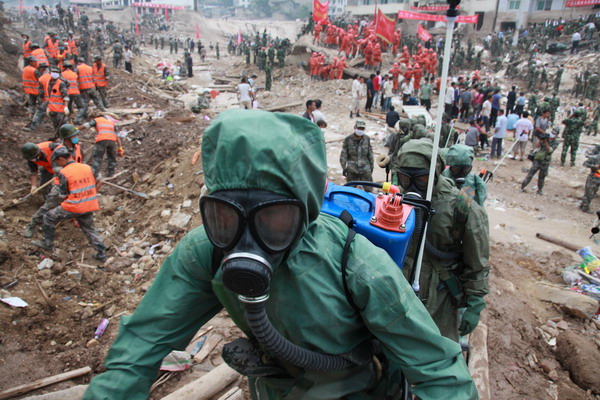Society
Rain forecast for mudslide-hit area fuels worries
By Wang Qian, Wang Huazhong and Hu Yongqi (China Daily)
Updated: 2010-08-12 07:05
 |
Large Medium Small |
|
|
ZHOUQU, Gansu - Heavy rain forecast for the coming days is threatening to swell an unstable lake trapped behind a barrier of mud and debris, endangering aid to residents of this landslide-hit county.
The latest fears came as the death toll from the country's deadliest landslide rose to 1,117, with 627 others still missing, local authorities said on Wednesday.
|
||||
The National Meteorological Center warned on Wednesday of a significant chance of more landslides in the coming days, with heavy rain of up to 90 millimeters expected to hit on Friday.
The warning added to the urgency of draining a debris-formed lake against its possible breach. The coming rains could cause the unstable lake on the Bailong River to burst and flood the areas hit by the landslide on Sunday.
The provincial government has ordered a mass evacuation of residents in areas prone to flooding and geological disasters.
But Jiao Yong, vice-minister of water resources, told a press conference organized by the State Council Information Office in Beijing on Wednesday that it is unlikely the mudslide-formed lake will collapse. The volume of water in the lake has halved after draining and underwater blasts, he said.
Jiao said extreme climatic conditions were behind the landslide in Zhouqu, but he also warned of the dangers of illegal construction near rivers.
As a county constantly affected by drought, Zhouqu received less than 200 millimeters of rainfall on average each year in the past few years, he said.
But the county experienced 97 millimeters of rainfall in 40 minutes on Saturday night, prior to the devastating landslide on Sunday morning, Jiao said.
There is also little hope of finding more survivors in the remains of the valley town of Zhouqu after the first 72 hours, considered the optimum time for rescuing victims, rescue analysts said.
To boost public health following the disaster, Gansu provincial health authorities said health workers completed sterilizing 171,075 square meters of the county seat and no disease outbreak has been reported.
Tons of garlic and Sichuan pepper, which health experts consider to be effective against epidemics, have been shipped to Zhouqu, a spokesman for the local health bureau said at a local press conference on Wednesday.
But public health is expected to remain a challenge.
While immediate cremation of the dead is considered to be the best way to prevent health problems, traditional burial is still one of the most prevalent forms of funeral practices in a county where one third of the population is Tibetan.
"A crematorium was completed just before the landslide struck, but it was not yet in operation," said Sun Junlin, a villager who helped rescuers carry bodies.
Yang Yuqiong, a doctor at a local clinic, said residents are encouraged to cremate the bodies but many still want to carry them home for traditional burials.
Many doctors in Zhouqu are also worried that high summer temperatures will fuel disease outbreaks.
Zhang Guoxin, deputy director of the emergency office of the Ministry of Health, said epidemic prevention remains the priority for health authorities.
Forty-seven civilian and military medical teams with 779 members, some of whom are ranked among the best in the country, are working in Zhouqu, authorities said.
Zhang said health authorities were also attempting to rebuild hospitals and clinics in the disaster-hit area as quickly as possible.
From January to July, China witnessed 26,000 geological hazards, nearly four times the figure for 2009, according to the Ministry of Land and Resources.
The disasters left 843 dead or missing, up 170 percent year-on-year, the ministry said.
Xinhua contributed to this story.




